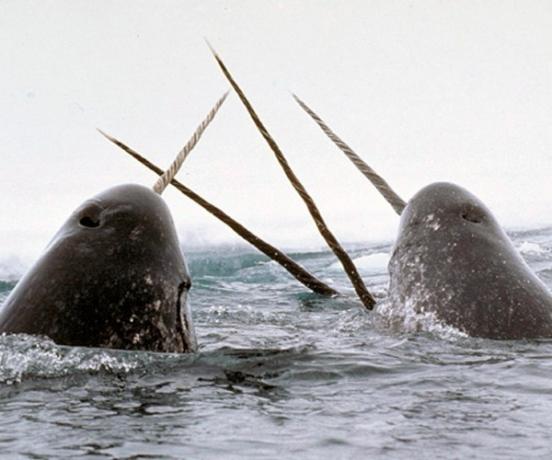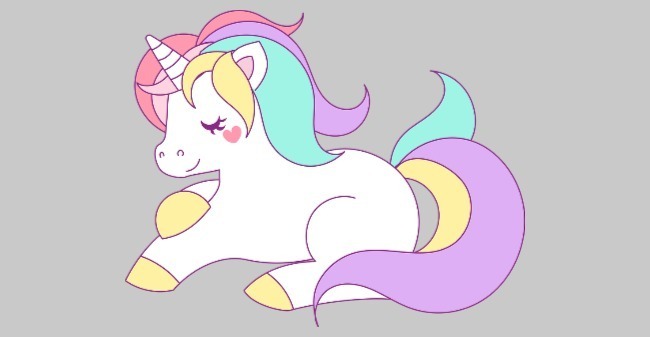Unicorn is a mythological creature, represented by the form of a horse, usually pure white, with a large spiral horn in the center of its head.
Also known as a licorn or lycorn, this fantastic being is considered a symbol of purity, chastity and strength, appearing in medieval narratives as an extremely docile animal and close to virgin maidens.
Etymologically, the word "unicorn" originated from the Latin unicornis, which literally means "a single horn".
As in the Middle Ages, the mythical figure of unicorns continues to fascinate people in contemporary literature and art. Famous books like the series Harry Potter, by the writer J. K. Rowling, and other well-known writers such as Peter S. Beagle, Lewis Carroll and C.S. Lewis portray the legend of unicorns in the universe created for their stories.
unicorn legend

No one is sure when the unicorn legend emerged, but its popularity grew from the medieval period onwards. The unicorn figure was directly linked to the Catholic religion, as it represents the virginity of the mother of Jesus, in addition to the miracle of God's incarnation through the immaculate womb of the Virgin Mary.
The unicorn achieved great popularity in ancient China and Europe, and became a myth and symbol of good luck. Over the years, there have been several descriptions of this mythological being, with the presence of a huge horn on the head being one of the common features.
According to mythology, unicorns have magical and miraculous powers, especially your horn, considered the most important part of your body, and blood. Both would have healing and regenerative gifts, capable of prolonging a person's life for many years, or saving someone who is on the brink of death, for example.
These fantastic animals had the power to purify all things, bringing life and light to what was once death and darkness.
According to legend, unicorns feed on clouds and sunlight, especially those emitted during sunrise and sunset. This is because these would be one of the few truly pure things in nature.
The Unicorn in the Christian Bible
The unicorn figure is present in several different passages of the Christian Bible: Psalm 22:21, Psalm 29:6 and Psalm 92:10 or even in Job 39:9-10, Numbers 23:22, Isaiah 34:7 and Deuteronomy 33 :17.
It doesn't actually mean that they are referring to mythological beings, but it can be considered a bad translation from Hebrew into other languages.
Originally the Hebrew term Reem was replaced by the word Monokers (Greek Septuagint Bible), which can be literally translated as "one horn" or "unicorn".
The Vulgate Bible, in turn, translated the Hebrew Reem for rhino, while Luther's translation was replaced by Einhorner ("a horn").
Most contemporary translations of the Bible, however, translate Reem like "wild ox" or "buffalo" to avoid confusion between this word and mythological being.
The Unicorn in Greek Mythology
Unlike the traditional view of unicorns (white horses with long horns and entwined in the half head), for Aristotle, one of the leading Greek philosophers, this fantastic creature was quite different.
According to the poet's descriptions, the unicorn would be a species of antelope (same family as the goats and gazelles), with a singular robust horn in the middle of its head.
According to the stories described in the Greek bestiaries, with emphasis on the Physiologist (2 d. C), unicorns were such pure and docile beings that only virgin women could approach these animals.
The Greeks believed in the existence of unicorns, however, as is well known, these fantastic creatures were not part of the original Greek mythology.
Did unicorns ever exist?
It is believed that "unicorns" may indeed have existed once, but not in the way the fantastical legends and myths describe them.
Approximately 200,000 years ago there was a creature called Elasmotherium sibiricum, also known as siberian unicorn or elasmotery. This prehistoric animal was related to the rhinoceros and characterized by having a huge horn on its head.

The Siberian unicorn went extinct thousands of years ago, but it is very likely that some creatures of the species have survived long enough to coexist with primitive humans.
From the contact between the first humans with these animals, the first legends and myths about the existence of unicorns may have originated.
Some long, intertwined horn-like fossils that are traditionally narrated as unicorns have also been found. But in reality it is the prey of narwhals (Monodon monoceros), a species of arctic sea whale. These animals are popularly known as "marine unicorns".

Learn more about the meaning of Mythology.
"modern" unicorns

The traditional symbology attributed to unicorns was adapted to different formats of contemporary media, such as cinema, television and the internet.
In fashion, for example, the figure of these mythological animals came to be represented as charismatic and extremely colorful creatures. The idea is to convey the feeling of happiness, peace and purity to consumers, feelings that unicorns have symbolized over the centuries.
In this way, unicorns became popular as characters in various consumer goods, such as notebooks, backpacks, clothing, decorative objects, etc.
What are "unicorn companies"?
Also known asstartups unicorns, these companies in the technology sector are named for achieving a price assessment in the market over US$ 1 billion (US$1 billion), this before they make their capital available on stock exchanges. values.
As well as the meaning traditionally attributed to unicorns, companies that achieve this feat have something extremely appealing and fantastic in their proposals.
Among some of the best known unicorn companies, the Facebook, O Dropbox, O snapchat, O Spotify, among others.
Learn more about the meaning of a Startup.

